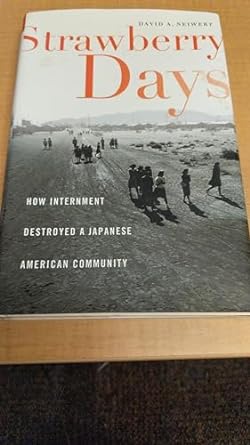




Download the free Kindle app and start reading Kindle books instantly on your smartphone, tablet, or computer - no Kindle device required.
Read instantly on your browser with Kindle for Web.
Using your mobile phone camera - scan the code below and download the Kindle app.

Follow the author
OK
Strawberry Days: How Internment Destroyed a Japanese American Community Hardcover – June 4, 2005
Strawberry Days tells the vivid and moving tale of the creation and destruction of a Japanese immigrant community. Before World War II, Bellevue, the now-booming "edge city" on the outskirts of Seattle, was a prosperous farm town renowned for its strawberries. Many of its farmers were recent Japanese immigrants who, despite being rejected by white society, were able to make a living cultivating the rich soil. Yet the lives they created for themselves through years of hard work vanished almost instantly after the bombing of Pearl Harbor. David Neiwert combines compelling story-telling with first-hand interviews and newly uncovered documents to weave together the history of this community and the racist schemes that prevented the immigrants from reclaiming their land after the war. Ultimately, Strawberry Days represents more than one community's story, reminding us that bigotry's roots are deeply entwined in the very fiber of American society.
- Print length288 pages
- LanguageEnglish
- PublisherSt. Martin's Press
- Publication dateJune 4, 2005
- Dimensions6.5 x 4.25 x 9.5 inches
- ISBN-10140396792X
- ISBN-13978-1403967923
The Amazon Book Review
Book recommendations, author interviews, editors' picks, and more. Read it now
Customers who bought this item also bought
Editorial Reviews
Review
“Strawberry Days takes an atypical tack...Neiwert's research into Freeman's role in the Japanese expulsion expands our knowledge of this Eastside 'founding father.' That plus an epilogue in which the author eviscerates modern revisionists who would defend the internment and disupute racism as one of causes, are, by themselves, worth the price of this book.” ―Seattle Weekly
“In the shadow of nearby Microsoft, Boeing and Nintendo of America, Neiwert conjures the ghosts of Japanese American family farms that walk these former fields of Strawberry Days.” ―David Mas Masumoto, author, Letters to the Valley and Epitaph for a Peach
“With grace and attention to detail, Neiwert mixes personal histories with contemporary documents to tell the poignant story of the Japanese immigrants who built a community on inhospitable soil, saw their farms and families grow, and then were stripped from the land by a climactic act of official injustice. Strawberry Days serves as a telling reminder of the human costs of the wartime removal of Japanese Americans, and a continuing lesson for our own times.” ―Greg Robinson, author, By Order of the President: FDR and the Internment of Japanese Americans
“David Neiwert's "Strawberry Days" brings the reader face to face with real people and a real community whose lives were shattered by American racism and wartime hysteria. It reminds us that the internment was not just the oppression of a huge ethnic group. It was the oppression of real human beings and their vibrant communities.” ―Eric Muller, author, Free to Die for their Country: The Story of the Japanese American Draft Resisters in World War II
“Neiwert makes a case against internment then, and racial profiling now, arguing that an innocent group of people were victimized by racism and scapegoating in response to the sneak attack. He has a spare and direct style of writing that does not go for the easy emotional buttons, allowing the story unfold in its own quiet manner. But the book is more than bygone history and it deserves a wide readership, especially post-September 11. America's response in 1941 to a racially different group of citizens, has echoes in policing Muslim communities in Detroit, Abu Ghraib prison, the Patriot Act and Guantanamo Bay. It is important to consider the past, and not repeat its mistakes. [A] thoughtful contribution to that discussion.” ―Tom Carter, Washington Times
“An insightful, well-reasoned analysis of why the internment happened and what its ramifications are.” ―Kevin Wood, Daily Yomiuri Online
About the Author
David A. Neiwert, an award-winning journalist, is the author of Death on the Fourth of July: The Story of a Killing, a Trial, and Hate Crimes in America and In God's Country: The Patriot Movement and the Pacific Northwest. He lives in Seattle.
Product details
- Publisher : St. Martin's Press; First Edition (June 4, 2005)
- Language : English
- Hardcover : 288 pages
- ISBN-10 : 140396792X
- ISBN-13 : 978-1403967923
- Item Weight : 1.22 pounds
- Dimensions : 6.5 x 4.25 x 9.5 inches
- Best Sellers Rank: #986,813 in Books (See Top 100 in Books)
- #3,455 in Discrimination & Racism
- #7,542 in Historical Study (Books)
- #8,877 in World War II History (Books)
- Customer Reviews:
About the author

David Neiwert is a journalist and author and an acknowledged expert in American right-wing extremism. He has appeared Anderson Cooper 360, CNN Newsroom, and The Rachel Maddow Show and is the Pacific Northwest correspondent for the Southern Poverty Law Center. His work has also appeared in "Mother Jones" Reveal News, "The American Prospect," "The Washington Post," MSNBC.com, Salon.com, and other publications. His previous books include "Of Orcas and Men: What Killer Whales Can Teach Us" (2015, Overlook), and "And Hell Followed With Her: Crossing the Dark Side of the American Border" (2013, NationBooks: Winner of the International Latino Book Award for General Nonfiction) and he has won a National Press Club award for Distinguished Online Journalism.
Customer reviews
Customer Reviews, including Product Star Ratings help customers to learn more about the product and decide whether it is the right product for them.
To calculate the overall star rating and percentage breakdown by star, we don’t use a simple average. Instead, our system considers things like how recent a review is and if the reviewer bought the item on Amazon. It also analyzed reviews to verify trustworthiness.
Learn more how customers reviews work on Amazon-
Top reviews
Top reviews from the United States
There was a problem filtering reviews right now. Please try again later.
Well done
B.
The Army took one look at him and said, 'Japanese interpreter.' He said, 'I'm third generation, I don't speak a word of Japanese.' 'You will.' He did.
The treatment of these people seems to have been a combination of racism, fear, and some feel a desire on the part of some people to get their lands and buildings. No only was there never a proven case of anything at all against these people, there was not even an accusation of problems among the far more Japanese Americans in Hawaii. There was never a suggestion of moving German-Americans or Italian-Americans into camps. My friend's father died in the camp. Two brothers joined the famed 442 Regimental Combat Team, one was wounded and highly decorated, the other was killed in action.
This is a book that reminds us that a real group of people were treated pretty poorly by the rest of us and still retained a sense of well being. Very well done.








